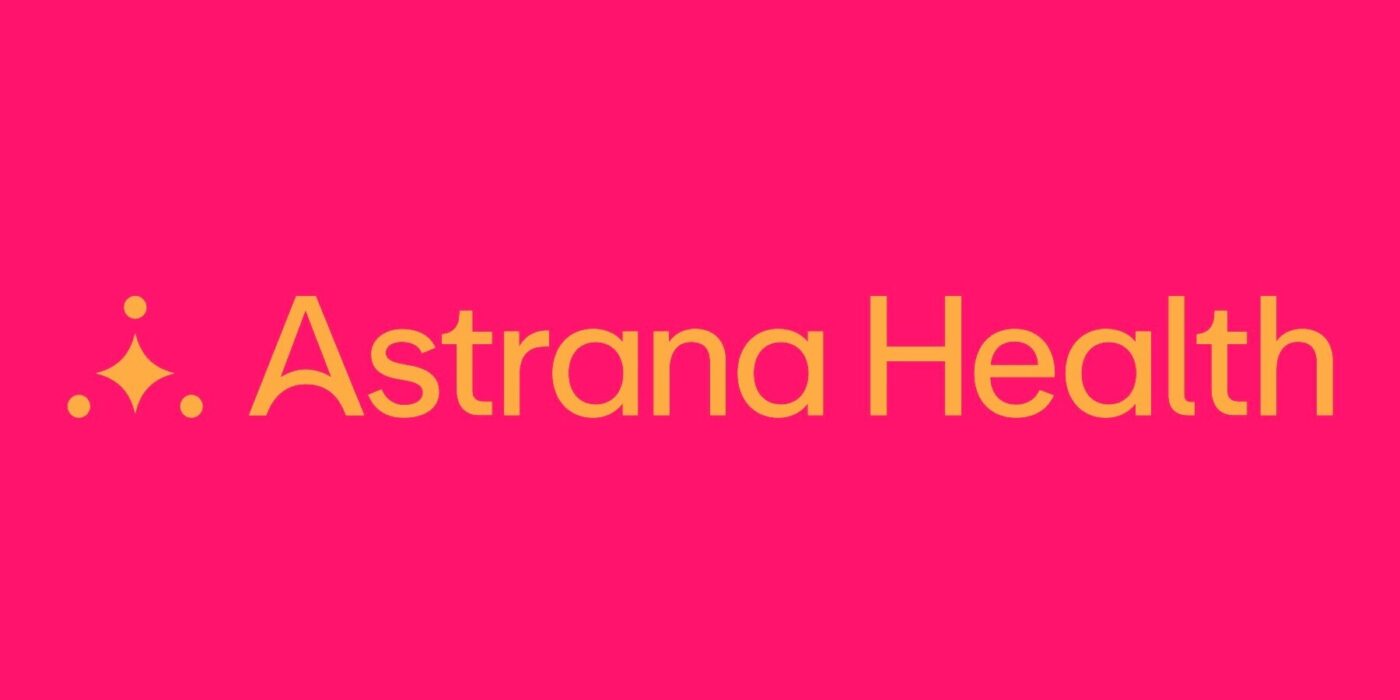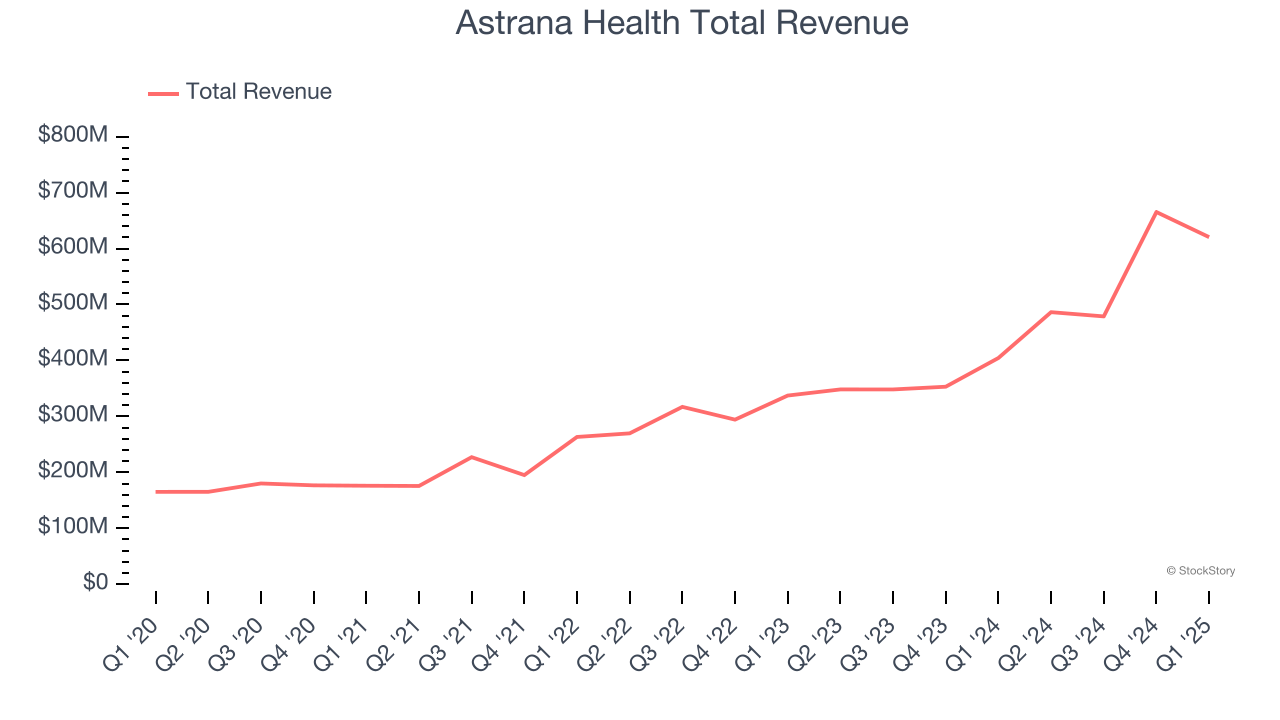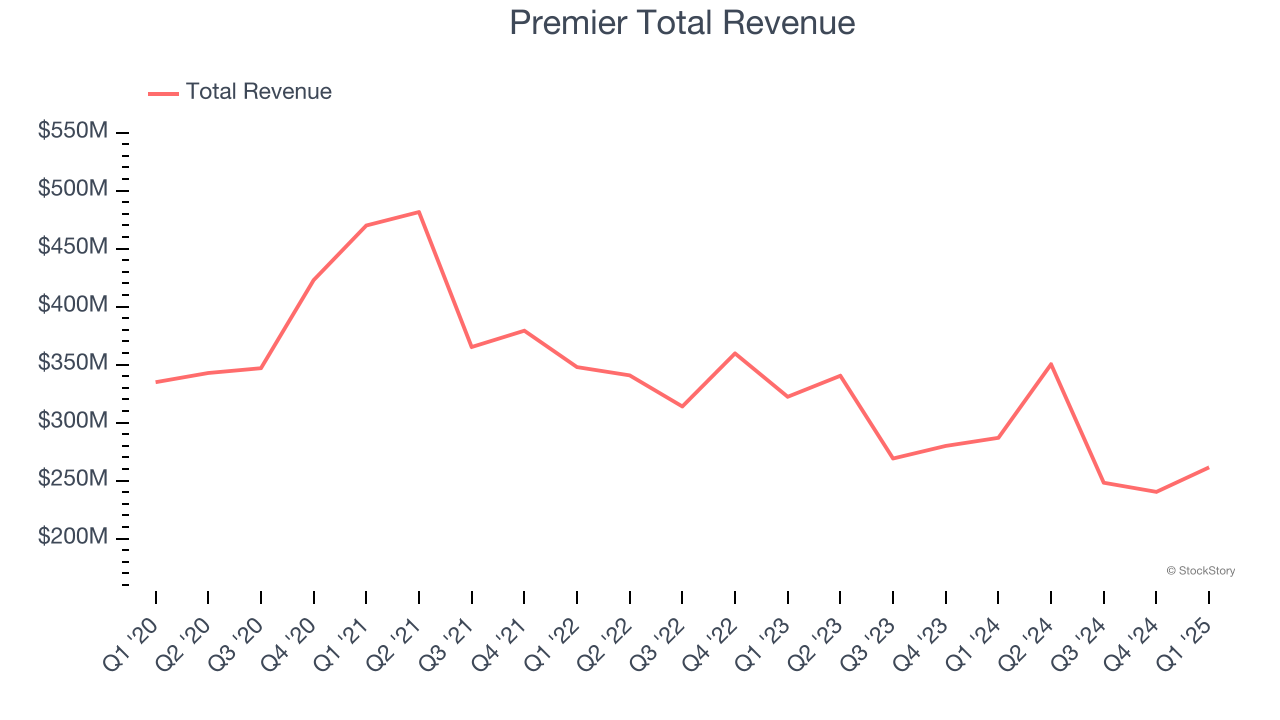
Looking back on healthcare technology for providers stocks’ Q1 earnings, we examine this quarter’s best and worst performers, including Astrana Health (NASDAQ:ASTH) and its peers.
The healthcare technology industry focuses on delivering software, data analytics, and workflow solutions to hospitals, clinics, and other care facilities. These companies enable providers to streamline operations, optimize patient outcomes, and transition to value-based care models. They boast subscription-based revenues or long-term contracts, providing financial stability and growth potential. However, they face challenges such as lengthy sales cycles, significant upfront investment in technology development, and reliance on providers’ adoption of new tools, which can be hindered by budget constraints or resistance to change. Over the next few years, the sector is poised for growth as providers increasingly prioritize digital transformation and efficiency in response to rising healthcare costs and patient demand for seamless care. Tailwinds include the growing adoption of AI-driven tools for patient engagement and operational improvements, government incentives for digitization, and the expansion of telehealth and remote patient monitoring. However, headwinds such as tightening hospital budgets, cybersecurity threats, and the fragmented nature of healthcare systems could slow adoption.
The 6 healthcare technology for providers stocks we track reported a mixed Q1. As a group, revenues beat analysts’ consensus estimates by 3.4% while next quarter’s revenue guidance was 0.7% below.
While some healthcare technology for providers stocks have fared somewhat better than others, they have collectively declined. On average, share prices are down 4.4% since the latest earnings results.
Weakest Q1: Astrana Health (NASDAQ:ASTH)
Formerly known as Apollo Medical Holdings until early 2024, Astrana Health (NASDAQ:ASTH) operates a technology-powered healthcare platform that enables physicians to deliver coordinated care while successfully participating in value-based payment models.
Astrana Health reported revenues of $620.4 million, up 53.4% year on year. This print fell short of analysts’ expectations by 2.5%. Overall, it was a slower quarter with full-year EBITDA guidance slightly missing analysts’ expectations.
"Astrana's strong start to the year reflects the continued momentum behind our mission to build the nation's leading patient-centered healthcare platform. Our differentiated clinical capabilities and technology-enabled delegated model continue to drive strong, profitable growth while delivering better outcomes for both patients and providers. Even in a complex regulatory and economic environment, we continue to prove that value-based care can deliver meaningful impact at scale with long-term sustainability," said Brandon Sim, President and CEO of Astrana Health.

Astrana Health achieved the fastest revenue growth but had the weakest performance against analyst estimates and weakest performance against analyst estimates of the whole group. Still, the market seems discontent with the results. The stock is down 11.7% since reporting and currently trades at $25.20.
Is now the time to buy Astrana Health? Access our full analysis of the earnings results here, it’s free.
Best Q1: Premier (NASDAQ:PINC)
Operating one of the largest healthcare group purchasing organizations in the United States with over 4,350 hospital members, Premier (NASDAQ:PINC) is a technology-driven healthcare improvement company that helps hospitals, health systems, and other providers reduce costs and improve clinical outcomes.
Premier reported revenues of $261.4 million, down 8.9% year on year, outperforming analysts’ expectations by 7.4%. The business had a very strong quarter with an impressive beat of analysts’ EPS estimates and a solid beat of analysts’ full-year EPS guidance estimates.

Premier delivered the biggest analyst estimates beat among its peers. The market seems happy with the results as the stock is up 11.7% since reporting. It currently trades at $22.94.
Is now the time to buy Premier? Access our full analysis of the earnings results here, it’s free.
Omnicell (NASDAQ:OMCL)
Driven by the vision of an "Autonomous Pharmacy" with zero medication errors, Omnicell (NASDAQ:OMCL) provides medication management automation and adherence tools that help healthcare systems and pharmacies reduce errors and improve efficiency.
Omnicell reported revenues of $269.7 million, up 9.6% year on year, exceeding analysts’ expectations by 3.7%. Still, it was a slower quarter as it posted full-year EBITDA guidance missing analysts’ expectations.
Interestingly, the stock is up 2.6% since the results and currently trades at $31.29.
Read our full analysis of Omnicell’s results here.
Evolent Health (NYSE:EVH)
Founded in 2011 to transform how healthcare is delivered to patients with complex needs, Evolent Health (NYSE:EVH) provides specialty care management services and technology solutions that help health plans and providers deliver better care for patients with complex conditions.
Evolent Health reported revenues of $483.6 million, down 24.4% year on year. This number surpassed analysts’ expectations by 4.9%. Zooming out, it was a mixed quarter as it also produced full-year revenue guidance slightly topping analysts’ expectations but a significant miss of analysts’ EPS estimates.
Evolent Health pulled off the highest full-year guidance raise but had the slowest revenue growth among its peers. The stock is down 22.7% since reporting and currently trades at $8.33.
Read our full, actionable report on Evolent Health here, it’s free.
Privia Health (NASDAQ:PRVA)
Operating in 13 states and the District of Columbia with over 4,300 providers serving more than 4.8 million patients, Privia Health (NASDAQ:PRVA) is a technology-driven company that helps physicians optimize their practices, improve patient experiences, and transition to value-based care models.
Privia Health reported revenues of $480.1 million, up 15.6% year on year. This result beat analysts’ expectations by 6.5%. It was a strong quarter as it also produced an impressive beat of analysts’ EPS estimates and sales volume in line with analysts’ estimates.
The stock is flat since reporting and currently trades at $23.19.
Read our full, actionable report on Privia Health here, it’s free.
Market Update
Thanks to the Fed’s rate hikes in 2022 and 2023, inflation has been on a steady path downward, easing back toward that 2% sweet spot. Fortunately (miraculously to some), all this tightening didn’t send the economy tumbling into a recession, so here we are, cautiously celebrating a soft landing. The cherry on top? Recent rate cuts (half a point in September 2024, a quarter in November) have propped up markets, especially after Trump’s November win lit a fire under major indices and sent them to all-time highs. However, there’s still plenty to ponder — tariffs, corporate tax cuts, and what 2025 might hold for the economy.
Want to invest in winners with rock-solid fundamentals? Check out our Top 5 Quality Compounder Stocks and add them to your watchlist. These companies are poised for growth regardless of the political or macroeconomic climate.
